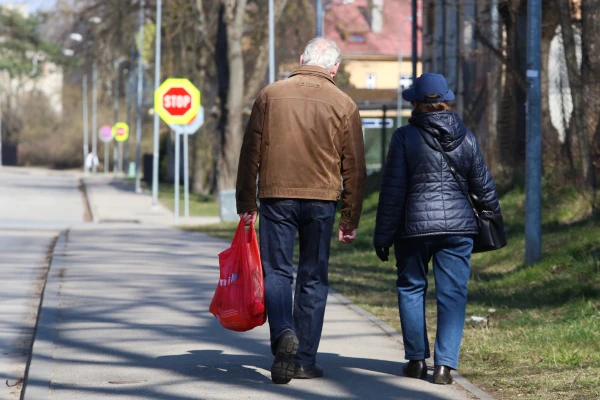
As of October 20, 18,875 people from at-risk groups have been vaccinated against the flu in Latvia — the most active are elderly people and patients with chronic diseases. However, the Center for Disease Prevention and Control (CDC) urges all residents to get vaccinated, reports LETA.
This autumn, the government has purchased 1.9% more doses of the flu vaccine than last year — a total of 133,120 doses. Residents have access to three types of vaccines adapted to the current strains of the virus to provide maximum effective protection.
As noted today at a press conference by the chief specialist in infectious diseases at Pauls Stradins Clinical University Hospital, Uga Dumpis, the only way to strengthen immunity against the flu is vaccination. He emphasized that in a hospital setting, the presence or absence of flu vaccination often plays a decisive role: during flu season and with an influx of patients, hospitals become overcrowded, and the illness itself can provoke serious complications — for example, a heart attack or stroke. The flu is particularly dangerous for the elderly, worsening overall health, including the progression of dementia.
The professor explained that the flu often causes pneumonia, complications related to the cardiovascular system, as well as exacerbations of chronic diseases. Vaccination is a safe and effective way to protect against such consequences.
In Latvia, the vaccination coverage among at-risk patients remains below 20%, which is considered low — while in other European countries, it can exceed 75%.
Experts point out that unvaccinated patients who are hospitalized often contract the flu precisely in the hospital, and the course of the disease is significantly more severe for them. In wards designed for two or three patients, there is a high risk of infecting others.
At the same time, other viruses continue to circulate, including Covid-19, for which vaccination is also recommended.
It is expected that in the coming months, the intensity of the flu will continue to rise, with the peak of the disease occurring at the beginning of next year.
The head of the Lung Disease and Thoracic Surgery Center at Stradins Hospital, Zaiga Kravale, pointed out that a significant part of society still refrains from vaccination, despite the fact that it is especially important for pregnant women, small children, patients with chronic diseases, and the elderly. It is these patients with the flu who often end up hospitalized with severe complications, most often with pneumonia or respiratory failure due to heart and lung diseases.
She emphasized that it is important to get vaccinated before any procedures or surgeries, as the flu can lead to death even after a successfully performed operation.
Family doctor Zane Dabolin also urged all residents, not just those in at-risk groups, to get vaccinated — to protect those around them as well. She reminded that vaccines are available, and everyone can discuss vaccination with their family doctor.
As Dumpis pointed out, "herd immunity" against the flu is impossible, but the goal is to achieve maximum coverage, especially in at-risk groups.
"The goal is not percentages, but reducing the number of problems," he emphasized.
The infectious disease specialist noted that even a young person without vaccination can face serious consequences from the flu: an unvaccinated person can have a temperature reaching 40 degrees, while a vaccinated person may only have around 37.
Experience shows that those who contract the flu in the hospital and are unvaccinated spend about a week longer in the hospital compared to vaccinated individuals.
According to the CDC, from October 13 to 19, flu activity in Latvia remains low — three clinically confirmed cases have been registered — 4.3 per 100,000 residents. In hospitals, four cases of type A flu have been laboratory confirmed.
Last week, 990 patients with acute respiratory infections visited family doctors, while 153 people were treated in hospitals for severe acute respiratory diseases — 4% of all hospitalized, most of whom were over 65 years old.
The frequency of positive Covid-19 tests has risen to 11.2%, with two deaths recorded with confirmed infection. According to the World Health Organization, the level of flu activity in Europe remains below epidemic levels, with type A viruses predominating.
As previously reported, this season, vaccines against the flu adapted to circulating strains are being offered to provide the best protection.
The CDC urges residents to consider vaccination and plan for it — the optimal time for this is late October and early November. This will allow immunity to form before the start of the epidemic peak and maintain protection throughout the flu season, which usually reaches its highest activity in winter and spring.
Last season, 146 deaths related to the flu were registered in Latvia, of which 94% were among unvaccinated patients.
Most of the deceased — 73% — were over 70 years old. According to the CDC, among unvaccinated elderly individuals, the risk of hospitalization was 1.7 times higher, and the risk of death was 2.8 times higher compared to vaccinated individuals.
A total of 121,829 people were vaccinated against the flu last season, which constitutes 6.5% of the population of Latvia. Most of those vaccinated were individuals over 60 years old (78,704 people, or 14.8% of that age group).















Leave a comment